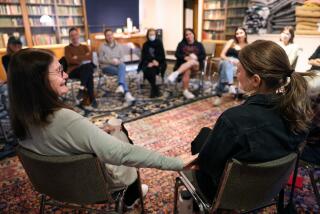‘In a death-denying culture, there is always another day to tell your loved ones how much you love them, to put off goals. . .’
- Share via
Sheila Rani Benter is one of America’s few death educators. Benter, a business teacher in the Sweetwater Union School District for 20 years, concentrated on the study of death and dying when she took her master’s degree in education in 1978 at San Diego State University. She says the study of death has been the most invigorating experience of her life. She took up marathon running, began teaching aerobic dance and stirred local controversy with the first death-acceptance class at the secondary level in San Diego. Though she is a lecturer who offers workshops dealing with grieving, suicide, death etiquette, living wills and death denial, Benter surprises participants with her enthusiasm and youth. The 42-year-old says her classes are about the business of living. Besides, the “shyest senior at Grossmont High” still can’t believe she is fulfilling a childhood dream. “It is so silly, after 20 years I still get really excited--and sometimes have to pinch myself--that I am really the teacher.” She was interviewed by Times staff writer Nancy Reed and photographed by Sandra Tatum.
I became very curious why education fails to teach the subjects that are most relevant to us.
When I was 11 years old, my mother died of cancer at age 27. My father, being from India--the old country with its different ways--his whole philosophy is that life just goes right on. She died at 3 a.m. in the morning and my dad sent me and my younger brothers off to school the next day.
I approached my principal in the early ‘70s, asking if I could teach a death and dying unit as part of an English honors section.
He said: “No, Sheila. Teaching death education is worse than teaching sex education.” And it just blew my mind, because I thought--we all have sex and we all die--and yet we don’t want to teach those things.
After I got my master’s, an experimental class was approved in 1979. Students had to have permission to come to the class. We would read and write, do critical thinking and get in touch with family. It was so successful; no one dropped out.
An appreciation for life is the whole premise of the class. When we get in touch with our own death, we no longer have an excuse to procrastinate.
In a death-denying culture, there is always another day to tell your loved ones how much you love them, to put off goals, to meet people maybe you have been putting off.
At first, the students are there out of curiosity. Most people think we are going to look at dead bodies. That is the most commonly asked question.
We do go visit a mortuary and a cemetery, but the whole concept of the class is on really a zest and joy for living and using every 24 hours as if I will die tomorrow. That encourages us to take risks, to try things we ordinarily wouldn’t try.
I start out illustrating that. Giving them a safe environment, getting them to say the word death--which is almost impossible in the beginning.
My students planned their funeral, their memorial, the music they would like. They designed their epitaph, wrote their own eulogy and they also had someone else write a eulogy for them. That’s an incredible experience when they ask their mother or father or a loved one to write a eulogy.
At the San Ysidro incident (the 1984 McDonald’s massacre), one of my students in the death-acceptance classes was a victim and one lived through it. The one who died, her parents used the epitaph that she wrote in her “perfect funeral project.”
The one who lived through it wrote me a letter that I always open my workshops and classes with.
She said she had seen the worst death possible, and having had the class--learning how to get in touch with feelings and learning how to appreciate life--allowed her to work through the terrible tragedy and grief.
People think courses such as history are important, she said, but you taught us about suicide, about loss, and you taught us how to live life more fully. She was proud to say that she was one of the few survivors that was working through it.
You want to hear something incredible? My school is the feeder school for the area where the massacre was. That happened in July of ’84 and my class had been canceled in June. I could never get over that. Just when it was so needed.


